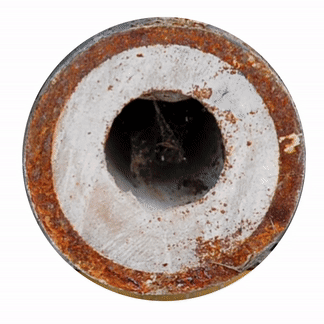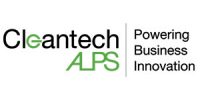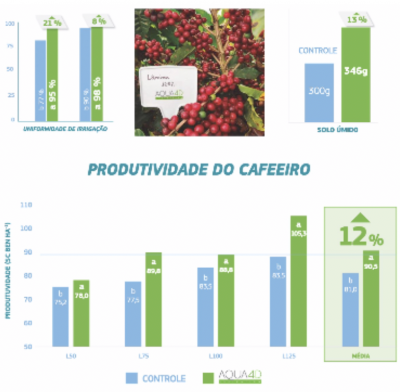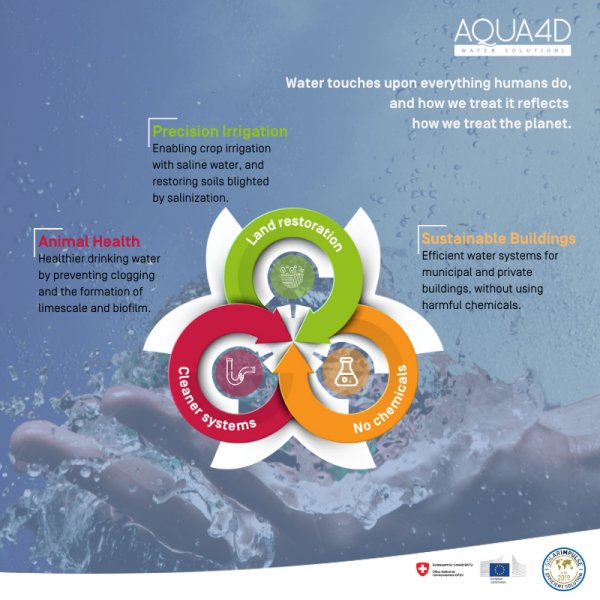Developing Circular Water Efficiency Across Multiple Industries
In many ways, AQUA4D has always been ahead of the curve. Water efficiency is truly hitting the headlines in 2020, with water stress becoming a hot issue in many countries, and new directives for increasing conservation and more efficient use by 2030. But optimizing the use and treatment of water has been a guiding principle for Switzerland’s AQUA4D ever since its founding back in 2004.
Coming from a land famed for pristine nature and crystal-clear water, the Swiss company’s mission from the outset has always been to “sustainably improve the water efficiency of companies with a positive impact on the health of people and planet”. Put simply, this water-smart technology subtly changes the physical structure of water, offering efficient and lasting treatment without using chemicals or consumables, and increasing the lifespan of water systems. And with H2O being such an essential and ubiquitous element, the possible use cases are endless.
Three industries, one goal
From the outset, AQUA4D® technology was not industry-specific, but rather widely applicable for any setting seeking to optimize the use of water and pursue a chemical-free sustainable future. “Back in the day, we were three academic engineers with a shared vision of developing an innovative water-smart cleantech,” says CEO Eric Valette. He continues: “We were excited about the potentials of the technology we’d created, and explored many directions before focusing on specific industries, with a ‘three industries, one goal’ coherent approach around which to strengthen our team.”
Nowadays the AQUA4D® logo is most often seen as an integral part of irrigation systems on farms, orchards and fields in countries from Argentina to Zimbabwe. But it wasn’t always this way. Indeed, a technology which is now notably making water savings for almond, avocado and wine growers started off in very different surroundings much closer to home: keeping water systems in Swiss buildings free from limescale and corrosion. Over the last 16 years, AQUA4D has developed systems designed for deployment in three different use cases: treating water systems in private and municipal buildings, optimizing irrigation systems, and keeping animals’ drinking water free from pathogens.
 Sustainable Buildings
Sustainable Buildings
Many buildings in Switzerland, Austria and Germany suffer from hard water – essentially, water containing a high mineral count, most notably calcium and magnesium. Over time this can be a disaster for pipes and water systems, with the build-up of minerals causing limescale and clogging.
With its effect in improving the dissolution of minerals, AQUA4D® technology eliminates existing clogging or limescale, while preventing any new occurrence and guarding against corrosion. This goes hand in hand with the sustainable management of buildings and resources: chemicals no longer need to be used, and systems remain cleaner with their lifespan increased.
“The originality of the AQUA4D® technology is that it does not change the chemical composition of the water, does not use chemicals, has very low energy consumption and requires no maintenance,” writes Bernard Dätwyler in a recent edition of Batitech Magazine (gebaeudetechnik.ch)


Case Study: In 2019, the Canton of Valais to include AQUA4D® technology in its resource efficiency directives for all new buildings, after several years of testing and close monitoring and follow-ups. The number of buildings equipped with this technology in Switzerland is over 2,500, a number expected to surge over the coming years as sustainability becomes a hot issue for ever more buildings and facilities managers.

 Precision Irrigation
Precision Irrigation
By 2030, almost half the world will be living in areas of high water stress, and we may add 1.5 billion more people to the population by then. Therefore, the need for improving water efficiency and simultaneously increasing food production has never been greater. This is precisely what Precision Irrigation with AQUA4D® achieves.
Due to dissolution of minerals by the physical treatment of water, AQUA4D® makes it possible for growers to irrigate their fields even with saline or brackish water with high electroconductivity (formerly unthinkable without resorting to solutions like reverse osmosis). Meanwhile, by leaching salts away, AQUA4D®gives new life to lands rendered practically unproductive by soil salinization. This is a game changer for the estimated 33% of irrigated land globally suffering the effects of salinity.
Last but not least, as AQUA4D® improves percolation into soil pores, soils stay moister for longer – meaning irrigation frequency can be significantly reduced. This promotes better water management and can lead to water savings of up to 30%.
Case Study: Recently published results from Brazil showed that AQUA4D® can contribute to a radical new water efficiency in coffee crops – a notoriously thirsty plant. The results of this comparative study showed not only an increase in irrigation uniformity but also significant increases in both productivity and soil moisture. (more information here)
 Animal Health
Animal Health
In animal feeding systems, the formation of biofilm can be hugely detrimental, acting as a perfect breeding ground for pathogens and bacteria.
AQUA4D® prevents biofilm adhering to the pipe surfaces (and flushes away existing biofilm), so the threat is removed while completely negating the need to use antimicrobial or chemical agents – taking out the middle man, so to speak. This leads to cleaner water, happier animals, and ultimately higher productivity.
What’s more, with resistance to antibiotic and chemical treatments increasing, there has never been a better time to deploy a sustainable biofilm removal method.
Case Study: Gemperle Family Farms, one of California’s largest egg producers, have seen startling results in 2020 with their first use of the AQUA4D system treating 360 L/min. They expect ROI in just a few months as not only has eggshell strength improved but overall production has increased by 3.5 – 5%. With 300,000 hens on site, that means significantly more eggs and higher productivity.

 Circular Sustainability
Circular Sustainability
Ultimately the water cycle is one planetary system, so better treatment of water in one industry can have positive effects in another. If less chemicals are used to soften water or keep pipes clean, there are ultimately less chemicals entering the water supply which will at some stage end up in irrigation systems. And if less chemicals or hormones are used in animals’ drinking water, this is kept out of precious groundwater.
On a human level, efficient systems also translate to more efficient workflows, with employees and managers spared the time and costs previously associated with maintenance of water systems.
On a wider societal level, and consistent with Sustainable Development Goals, if growers in water-scarce regions can sustainably transform their poor-quality water to use for irrigation, this leaves precious potable water available for human consumption. And if plants need to be irrigated ~30% less frequently, this leaves more water available.
This is circular sustainability and the improvement of water efficiency from tap to field and beyond.
Worldwide
Water-Smart
Circular Sustainability
Solar panel-powered production at AQUA4D HQ

“Aqua4D’s management had a vision 16 years ago that slowly turned into reality… it can clearly be defined as a pioneer in the cleantech field and represent the forefront of the new generation of tech coming on the market.”
– Eric Plan, CleanTech Alps



 Precision Irrigation
Precision Irrigation
 Circular Sustainability
Circular Sustainability 